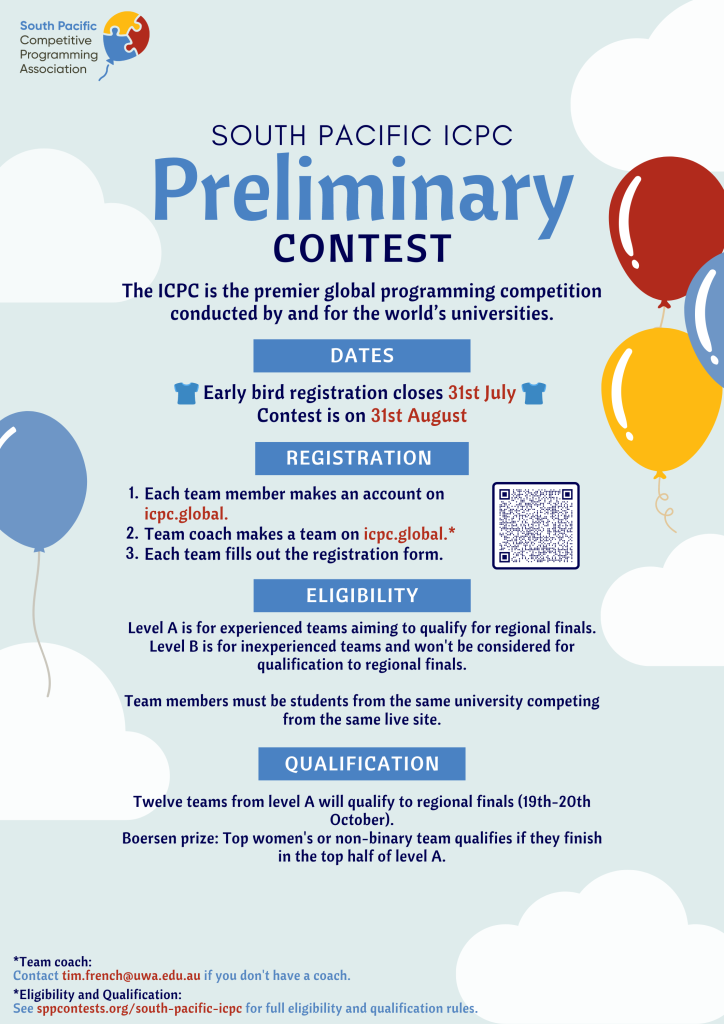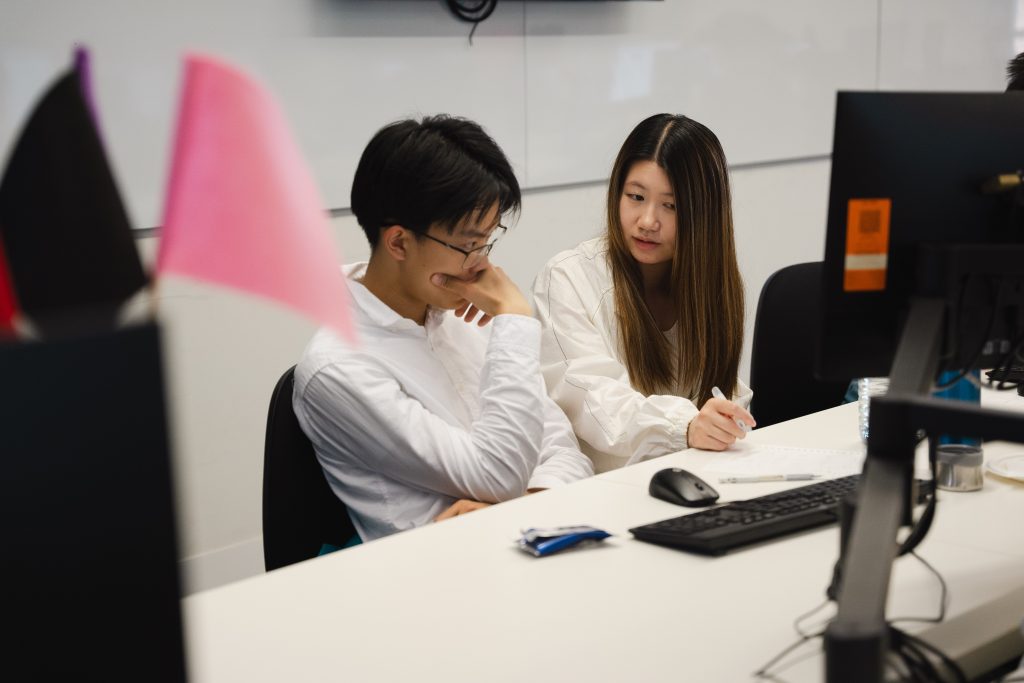
The ICPC is the premier global programming competition conducted by and for the world’s universities. It fosters creativity, teamwork, and innovation in building new software programs, and enables students to test their ability to perform well under pressure.
| 3 | students | 5 | hours |
| 1 | computer | 12 | problems* |
In 2021, more than 50,000 of the finest students in computing disciplines from over 3,000 universities competed worldwide in the regional phases of this contest. We conduct ICPC contests for the South Pacific region, with top teams qualifying to the World Finals.

Registration open now. Early bird registration closes July 31!

Preliminary Contest
The Preliminary Contest will be held on 31st August 2024. It is a distributed contest, with live sites at various universities across the region.
Eligibility
Official teams must be made up of exactly three students from the same institution who all meet the ICPC eligibility criteria. Most notably, each student must:
- be enrolled in a degree program at the team’s institution
- be an full time, co-op, exchange or intern student
- have not competed in two ICPC World Finals
- have not competed in ICPC regional contests in five different years
- commenced post-secondary studies in 2020 or later OR born in 2001 or later.
We welcome ineligible university and high school students to compete in unofficial teams. Unofficial teams may compete remotely.
Contact your institution’s coach if you need help finding a team.
Sites
| Site | Contact | URL |
| Adelaide | Cheryl Pope | https://acpc.io/ |
| Aukland | Rajko Nanadov | https://www.auckland.ac.nz/en/science/about-the-faculty/school-of-computer-science.html |
| Brisbane | Larry Wen | https://www.griffith.edu.au/study/engineering-it-aviation/computer-science |
| Christchurch | Kourosh Neshatian | https://www.canterbury.ac.nz/study/academic-study/subjects/computer-science |
| Melbourne | Junhao Gan | https://study.unimelb.edu.au/find/study-areas/computer-science/ |
| Perth | Tim French | https://pcs.org.au/ |
| Sydney | Lijun Chang | https://www.sydney.edu.au/courses/subject-areas/major/computer-science-science.html |
| UNSW Sydney | Raveen De Silva | https://www.unswcpmsoc.com |
Levels
The Preliminary Contest has two levels.
Level A
Level A is suitable for teams with experience, who are aiming to qualify to the Regional Finals. The problems in Level A are much harder, and may not be approachable for most teams.
If you have competed in informatics contests in high school, or if you have placed in the top 20 teams in a SPAR contest, then Level A may be suitable for you.
Level B
Level B is suitable for most teams as it contains more approachable problems. Prior experience in programming contests is not required.
Teams competing in Level B will not be considered for qualification to Regional Finals or the Boersen prize.
Reading the problem sets from past years may give you an idea of what to expect in each level of the contest.
There will be trophies for the top teams in each level.
Registration
All teams will register by completing this form. Official teams must also be registered on icpc.global by their coach.
Official teams
Official teams must also be registered on icpc.global by their coach.
Official teams from Australia and New Zealand will be charged a registration fee of $100, which is typically paid by the institution. For official teams who register by the early bird deadline, each team member will receive a T-shirt. See here for sizing charts.
Official teams from other countries can register free of charge, but will not receive T-shirts.
Unofficial teams
Unofficial teams do not have to be registered on icpc.global. They can register free of charge, but will not receive T-shirts.
Rules
- Site coordinators will provide one copy of the problem set per team member, in addition to the PDF and sample data on the contest server.
- Teams must use only one computer, one keyboard and one monitor.
- Teams competing at a live site must use only the devices provided, and cannot bring their own.
- The only exception is for unofficial teams competing remotely, who should use their own devices and arrange an informal system to claim and unclaim use of the keyboard.
- Teams may use any amount of paper reference material. This includes books and printed notes.
- Teams may use pens and paper, for developing and discussing solutions among themselves.
- Teams should have no internet access other than to the contest server (under construction) and contest website (this website). Site co-ordinators should ensure this is the case via invigilation or using a custom lab computer image.
- Teams may print code from their computer. Site co-ordinators should make a best effort to ensure this is supported.
- Teams must not discuss the problems with people outside the team during the contest. Any questions must be sent through the DOMJudge clarification system.
- Electronic devices (phones, tablets etc) must not be used during the contest.
- All submitted code must have been entirely typed during the contest.
- Teams may not install or store anything on the computers before the contest.
- Any code written during the practice contest must be erased before the Preliminary contest.
- Generative AI tools cannot be used.
- To solve a problem, teams should submit source code through the DOMJudge system written in C, C++, Java or Python. The only feedback teams will receive is “compile error”, “runtime error”, “time limit exceeded”, “wrong answer” or “correct”.
- Details of the scoreboard, documentation and judging environment are available on the Technical Specifications page.
- Any teams found to be cheating will be removed from the contest server and disqualified.
Environment
All sites will provide teams with computers running a recent version of Debian and a variety of editors and IDEs. Please contact your site coordinator for further details.
Schedule
Tentative; subject to change.
| Time | Activity | Notes |
| 10:45 | Check in | All competitors on-site |
| 11:00-11:30 | Practice contest | Official teams must have all three contestants on-site |
| 11:30-12:00 | Break | Site coordinators must reset computers and keep problem sets secret |
| 12:00-17:00 | Preliminary Contest | Scoreboard freezes at 16:00 |
| 17:30-18:30 | Presentation | Scoreboard reveal, awards ceremony and explanation of solutions, over Zoom |
Boersen Prize
Ms. Raewyn Boersen, previous South Pacific Director, Founder, and recipient of the Mark Measures Distinguished Service Award, has contributed significantly to the International Collegiate Programming Contest (ICPC) for over 30 years. Raewyn has built a strong community that enabled young computer scientists in Australia and New Zealand to showcase their problem solving skills internationally. She has also encouraged young women to explore the fun in computer programming.
The Boersen Prize celebrates Raewyn’s work and legacy for the South Pacific Region, and encourages diverse participation in South Pacific ICPC contests. The Prize is awarded to the top team whose members are all women or non-binary. Additionally, they will be invited to the Regional Finals if they were placed in the top half of teams in Level A.
Qualification to Regional Finals
Our region is comprised of three geographical divisions.
| Western Division | Victoria, WA, SA, Tasmania |
| Central Division | NSW, Queensland, ACT |
| Eastern Division | NZ, Fiji, PNG and all others |
Qualification is conducted in four steps.
- Step I: The top two universities in Level A from each Division will qualify for the Regional Finals.
- Step II: The top six remaining teams in Level A will qualify for the Regional Finals, subject to the constraint that each institution can have at most two teams qualify.
- Step III: The Boersen prize is awarded to the top team containing only female or non-binary identifying competitors in Level A. Additionally, they will be invited to the Regional Finals if they were placed in the top half of teams and were not selected in Selection Steps I or II. A wildcard spot will be extended to the next qualifying team if the Boersen prize team was already invited in Steps I or II. It is possible that a University may have a third team selected under this selection step.
- Step IV: Additional teams may be awarded wildcards to compete at Regional Finals, at the sole discretion of the Regional Contest Director.

Regional Finals
The Regional Finals will be held on 19th and 20th October 2024 at UNSW Sydney.
Rules
As in the Preliminary Contest.
Environment
To be announced.
Event Information
Accommodation
Teams from outside Sydney will stay at AGSM Residential.
- All visitors can check in from 2pm on Friday 18th.
- All visitors should check out on the morning of Sunday 20th, and depart that evening.
- All visitors have individual rooms.
Please contact Raveen de Silva for further information. In particular, if you cannot practically depart Sydney on the evening of Sunday 20th, please advise ASAP.
Note: teams from UNSW will not be provided accommodation.
Local Transport
Tickets and Opal
Opal is the smartcard ticketing system used to pay for travel on public transport in Sydney. We recommend that you don’t buy a Opal card, and instead pay by tapping your contactless card or device on the Opal reader. This charges an adult fare, but unfortunately interstate and overseas students are typically ineligible for concession fares anyway.
Light Rail
The recommended mode of transport between campus and the CBD is the Sydney Light Rail. Use the UNSW High Street station on the L2 Randwick line.
Transfer at Central Station for intercity trains, interstate trains and coaches or Sydney Airport.
Sydney Airport
Sydney Airport has train stations at both International and Domestic terminals on the T8 Airport & South Line. However, there is an additional fee of $17.34 each time you enter or exit these stations, so it may be cheaper for your group to take a taxi or rideshare together, or connect using the route 350 or 420 bus.
UNSW Kensington Campus
You can find a campus map here.
Qualification to World Finals
The top two universities will qualify to the ICPC World Finals.